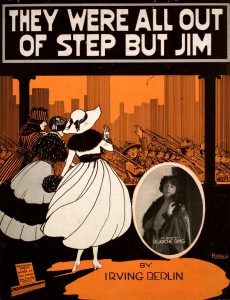Answer 1:
They’re not. All the other records in the world are weird. Irish records are the only normal ones.
‘Did you see my little Jimmy marching
With the soldiers up the avenue?
There was Jimmy just as stiff as starch
Just like his father on the seventeenth of March.
Did you notice all the lovely ladies
Casting their eyes on him?
Away he went to live in a tent
Over in France with his regiment.
Were you there, and tell me, did you notice?
They were all out of step but Jim’
Answer 2:
OK, maybe a little weird, but with good reason.
-
1922
In April 1922, in the series of events that began the short but vicious Irish Civil War, a group of Republican guerrilla fighters took over The Four Courts, the complex of buildings in the centre of Dublin that coincidentally housed the Public Record Office of Ireland. They used the most solid structure in the complex to house their large hoard of munitions. This was the Treasury store-room of the PRO.
When the phoney war ended on June 29th 1922, their opponents began to shell The Four Courts and on the morning of June 30th, a series of enormous explosions took place. The munitions dump inside the Treasury had detonated. As a result every single document in the Treasury was destroyed.
Those documents included:
- The census records of 1821, 1831, 1841 and 1851;
- Church of Ireland parish records dating back to the 17th century;
- Deeds going back as far as 1174;
- Court records dating back to the 13th century;
- Military records with details of local yeomanry from the 18th century;
- Transportation records;
- Wills going as far back as 1500;
- Records of the huge land transfers of the 17th century.
Before June 30th 1922, Ireland had one of the richest sets of historical documents on the planet. What happened on that day is the reason so much Irish research on periods before the 1850s is now focussed on bizarre, otherwise unimportant sources: tithe books, rent rolls, sectarian head-counts …
But what wasn’t in the Treasury is still there: fragments on their way back from the Reading Room or out for rebinding, finding aids, published copies … And of course many records were never in the PRO in the first place – other church records, civil registration records, local tax records, the 1901 and 1911 censuses and much more.
-
One-and-a-half languages
If you’re researching German ancestors, you have to deal with records written in the German language. If you’re researching Russians, you’ll come up against Russian. If you have Irish, you’ll be looking at records apparently in English, but distorted by the huge background presence of a completely different language, Gaelic.
Take surnames, for example.
Well into the nineteenth century – especially in the poorest areas of the West and North from which there was most migration – the Irish language, Gaelic, was the language of everyday life. So when a baptism or marriage or burial was recorded, most of the people being recorded supplied their names in Gaelic. But no written records of these events were ever kept in Gaelic. So the record-keeper somehow had to import those Gaelic surnames into English.
The result was an extraordinary range of variation, with names mangled and distorted out of all recognition. First the venerable Gaelic prefixes Ó and Mac (meaning “grandson of” and “son of”) were treated as nuisances to be got rid of. Then the English-speaking record-keeper wrote down what he heard. Or what he thought he heard. Or what he thought the meaning of the surname was. Or a completely different English surname that just sounded a bit similar.
So Ó Maoildeirg (meaning “grandson of the red monk”) became Mulderrig. But it also became Reddington: I’ve seen members of the same family baptised as both. Mac Giolla Bhríde (“son of the follower of St. Bridget”) became Bride and McBride and Gilbride and Kilbride. Mac an Bhreithiún (“son of the judge”) is in the records as Breheny and Brehon and Judge and Abraham. Ó hIongardáil became the stout, bully-beef English surname Harrington.
In sum, one of the biggest obstacles to successful research in Irish records is the lack of appreciation of the extraordinary variation in the written records of Irish surnames. They are unimaginably slippery.
There are so many of you and so few of us
The relationship between Ireland and the descendants of those who left Ireland is unique. There are over ten times more people claiming Irish descent in the US alone than there are in the Old Country itself.
For a long time, this was a source of shame in Ireland – what kind of a country forces so many of its people to leave? Genealogy, for the Irish overwhelmingly a process of re-knitting family connections broken by emigration, was bizarre and unrespectable.
“We spent a long time sweeping all that under the carpet, don’t be bringing it out now”.
In the 1990s, that began to change. For whatever reason, we began to come to terms with Ireland’s history and official attitudes to what was now our “disapora” began to shift. The Irish nation became looser and baggier, to include Irish-America, Irish-Australia, Irish-Canada. (Irish-Britain is still a bit of a stretch, but we’re getting there.)
One practical result was that official assistance for people researching their Irish ancestry mushroomed. It became government policy to make as many records as possible freely available online. The extraordinary success of the digitised 1901 and 1911 censuses showed what could be done. Since then Griffith’s went free, the Catholic register microfilms went free, and, most extraordinary of all, last September almost all of the state records of births, marriages and deaths went free.
The effect has been that it is now straighforward to take any Irish family back to the mid-nineteenth century, a revolutionary change completely unforeseeable even two or three years ago. And Irish research is the least commercialised of any English-speaking country.
So yes, weird, but mostly in a good way.


Strange anglicizations applied to first names too. Who can believe that Marmaduke is an Irish name? But it was originally Muiredach.
Dear john,
I look forward to your e-mails to round out my understanding of Irish history and records. On the eve of st. Patrick’s day how about a listing of records and sites that are free on the net to search. Just a suggestion.
Hi Ron.
Already done – “What Irish records are online?”
Download the free app ‘Ancestor Network’ suitable for iOS, iPad, iPhone, and android devices and see this has a comprehensive list of Irish genealogy and history websites as well as a map showing where the key archives and libraries and museums are based in Dublin.
Excellent summary, thanks John
Another great read John. However, my genealogical frustration and regret came rushing back when you listed out the records destroyed in 1922. If only those Census records fully survived, what an amazing picture of our families we would have: if only! Because of it, I’ve spent years looking for my elusive great-great-great grandfather on my father’s side: no other records: census, church, civil, land or military have bridged that gap . . . yet!
Thanks John.
Thank you John for today’s blog. I am copying it and forwarding it to all my children and grandchildren to help them better understand part of their history.
Do you recommend a list of genealogists in Ireland we can contact for help? What would you say is the normal hourly cost of research.
Have a look at Accredited Genealogists Ireland (of which I am a member). Hourly rates vary, but you’ll get a full quotation before spending anything.
John, thank you for the following quote:
“In sum, one of the biggest obstacles to successful research in Irish records is the lack of appreciation of the extraordinary variation in the written records of Irish surnames. They are unimaginably slippery.”
I can’t emphasize this enough in the classes I teach on Irish genealogy here in the states. Beginners (the majority of the people who come to my workshops) have a hard time grasping the concept that there is no “correct” spelling of given names, surnames or place names. Occasionally I have a tough sell trying to convince a client that the person whose name is not like the one they are used to seeing is actually their ancestor. How about “Conners” and “Cahir”? Or “Canfield” and “Cantwell”? Just to name a couple!
Thanks John, Really entertaining and a real factual and historical sequence of events.
Ken
Any update on when the images of the earlier marriage and death records might be available? Thanks
In the “you just never know category”: A few years ago when researching in the National Archives, I was lucky enough to discover that a remnant of the 1821 census (did it fall off a shelf and get buried under stone?) includes my family’s townland in Cavan – and right there on the microfilm was my 3rd great grandfather and family. When I found them I nearly screamed.
Thanks, John, for all your hard work!!
Certainly enjoy your posts as they are so easy to read and digest. Therefore, like someone else posted, I, too, am copying this blog post for my family members to read and better grasp the difficulty in locating our ancestors, “across the pond.” =)
Don’t really know where to begin. Relatives came during the famine from the area around Sligo. Family names include Gannon, and Sullivan. Both came to the USA. Any help would
be greatly appreciated. Roberta Gard(King-Sullivan-Gannon) Argendeli
Hi John
Many thanks for all your helpful work. What I want to know is where are the censuses 1861,71,81 and 91? The ones before are blown up and the two after are available but where are these ones? Thanks!
John, really enjoy your blog. You comment on many of the problems I have encountered. The names drive me crazy. Even my relatively simple name, Crane, has several common variations. One recent experience was in a deed from about 1760. The leasehold was formerly held by a “Thirrily.” I was thoroughly stumped. Thought it must be mis-print. The name sounded Italian, maybe, who knows? … Until an Irish friend said it would be pronounced as “Turley.” Ah, of course, that is a fairly common Irish name, I thought to myself. One thing I often forget in the game of guessing names recorded based on how they sounded to a clerk is that in Ireland and perhaps in Britain, the “th” sound is pronounced as “t.” Its those little things……
I would love to know more about my Irish roots my grandfather lived in Derry county James Mcgonigle. I know that I had family who settled in New Jersey,New York, West Virginia and Ohio if anyone has information in regards to my roots I would love to know. Thanks